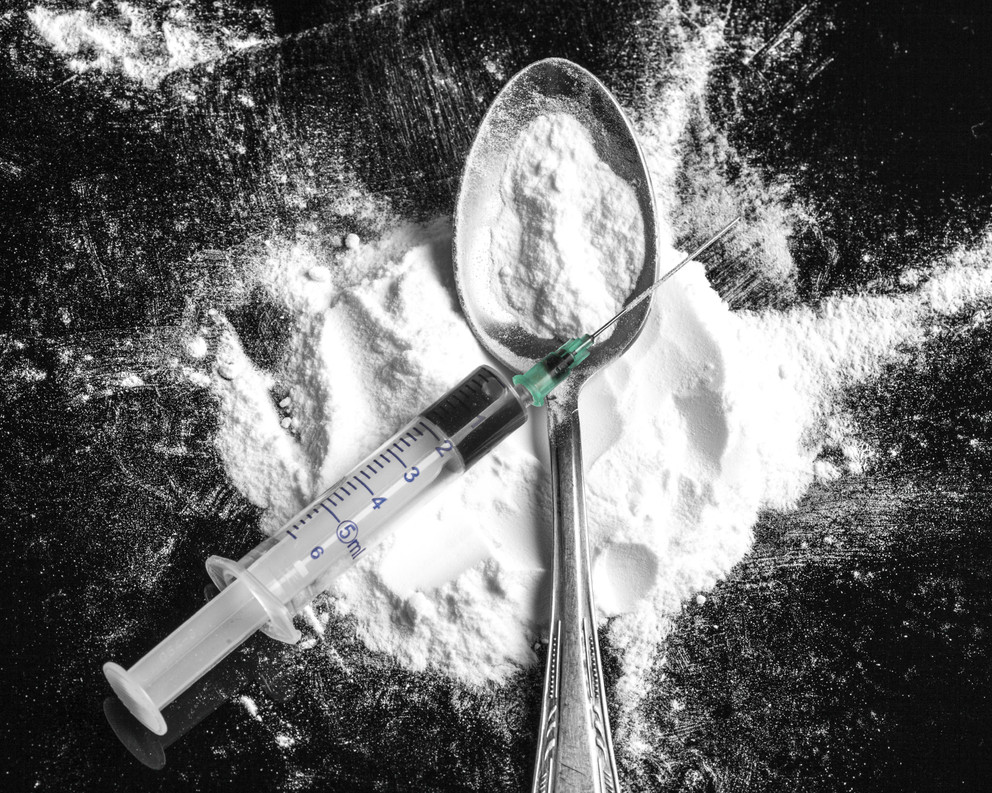Heroin is a highly addictive drug made from morphine. It is classified as a Schedule I drug, which means it is a drug with a high potential for misuse and no currently accepted medical use. Using this drug can cause overdose and dangerous interactions with other prescribed medications and drugs you are taking.
By understanding how long it can stay in your system, how it affects the human body, and other important details worth knowing about taking it, you can determine the risks and variables and how to deal with them.
How Long Does Heroin Stay in Your System?
If you are about to take a drug test and are wondering how long heroin can stay in your system, remember that it is a fast-acting drug with an extremely rapid half-life of 2 to 6 minutes. This means it can be difficult to detect in standard drug screenings. It is also metabolized to 6-acetyl morphine and morphine. Morphine’s half-life is 1.5-7 hours, while 6-acetyl morphine’s half-life ranges from 6 to 25 minutes.
Once the drug metabolizes, it gets broken down and is detectable on standard drug screening tests for 1 to 4 days. It takes 4 to 5 half-lives for the drug to be completely out of your system.
Here are some ways to detect heroin:
- Hair test
Heroin can be detected through a hair follicle drug test for up to 90 days after use. You may have much longer hair detection windows if you have been using heroin for longer.
The process involves getting 90 to 120 hair strands as a sample, then securing the hair sample in foil. You can expect to get the results within 48-72 hours if you screen negative, while it usually takes an additional 72 hours to confirm presumptive positive results.
- Urine
Urine test is the most frequently used type of drug screening. Compared to other drug tests, this one is more affordable and easier to administer. If you take heroin, it can show up on your standard urine test anywhere from 1 to 4 days after your last use.
- Blood
Heroin metabolites can be detected in your blood. This type of drug test may be ideal for determining the difference between recent heroin use and the therapeutic intake of opioids for pain relief following overdoses or traffic accidents.
- Saliva
If you are undergoing a saliva test, high heroin metabolite 6-acetyl morphine levels can be detected in your saliva samples. This test may be more ideal than urine screens in certain situations to detect heroin use, but it should be administered quickly after the last heroin use for more accurate results.
Is It Possible to Get a False-Positive Result?
Morphine is a natural substance taken from the seed pod of opium poppy plants. Therefore, eating foods with poppy seeds, such as bagels or muffins, can lead to a false-positive result. Most of the trace amounts of morphine and codeine are removed during processing, but there can be a tiny amount of opiate residue left in your foods. Unfortunately, it is sufficient to trigger a false-positive result on a drug test.
You are at a higher risk of getting a false-positive result if you take a drug test within two hours of eating poppy seeds. They are also detectable in your urine for as long as 60 hours, depending your consumed amount. Furthermore, you can also get a false-positive result for opiates if you take certain medications on enzyme-mediated immunoassays (EIAs), including quinolones, rifampin, and diphenhydramine.

What Are Heroin’s Common Side Effects?
Aside from the initial high, using heroin lets you experience various physical side effects, including the following:
- Your mouth may become dry
- You may start nodding in and out
- Your arms and legs will feel rubbery and heavy and rubbery
- You may experience dulled emotions and a diminished mental capacity
How Long Do the Effects of Heroin Last?
The immediate effects of heroin depend on how it is taken. For instance, the effects may be felt within 8 seconds if it was injected or within 15 minutes if it was smoked or snorted. The effects can last for up to 5 hours.
What Does Heroin Feel Like?
People who use heroin take the substance to avoid or numb their pain. It is used more for self-medication than for recreational and social reasons. This is one reason why most users are dealing with anxiety and depression, which may suggest that they take it to help them deal with their mental health condition’s symptoms.
Hitting heroin releases a variety of chemical changes in the brain, including a feeling of intense pleasure. Common effects are a rush of euphoria followed by a drowsy state alternating between wake and sleep. However, it has a rebound effect that worsens unpleasant feelings over time.
The heroin high depends on the user’s personal background and expectations. Because of this, one might feel intense pleasure and relief from the substance, while others might find the effects to be unbearable and unpleasant.
How Long Does a Heroin High Last?
Heroin manufactured illegally has various strengths, purities, and substances. It is usually sold on the street. The heroin high can be felt right away, and their effects last depending on the dose. For instance, a wave of intense euphoria lasts anywhere from 45 seconds to a few minutes. Other effects peak for 1 to 2 hours and most effects start to wear off within 5 hours.
What Are the Signs of Heroin Use?
Heroin users exhibit visible behavioral changes, especially when they get addicted. They will often center their lives around continued heroin use. You may notice that someone might be using heroin if they have these common physical and behavioral signs:
- A feeling of having heavy hands and feet
- Constricted pupils
- Dry mouth
- Feelings of nausea
- Financial problems
- Flushed skin
- Legal problems
- Mood changes
- Needle marks on the body
- Nosebleeds
- Secretiveness and lying
- The presence of drug paraphernalia
- The sudden appearance of new friends
- Weight loss
- Withdrawal from friends and family
- Weak pulse
- Shallow breathing
- Loss of consciousness
What are the Symptoms of Heroin Addiction?
Heroin addiction can be shown through physical, behavioral, or psychological warning signs, such as the following:
- Physical warning signs
- Constipation
- Constricted or small pupils
- Falling asleep without warning
- Itchy or flushed skin
- Nausea
- Slow or irregular breathing
- Slurred or incoherent speech
- Stomach pains
- Vomiting

- Psychological and behavioral warning signs
- Anxiety
- Avoiding eye contact
- Depression
- Hostile behavior toward loved ones
- Irritability
- Lack of interest in hobbies
- Loss of motivation
- Lower attention to personal hygiene
- Lying
- Mood swings
- Poor performance at school or work
- Repeatedly borrowing or stealing money
- Wearing long clothing to hide needle marks
- Withdrawal from friends and family
What Are the Health Risks of Using Heroin?
Continued use of heroin can cause health risks. Short-term risks are fatal overdose, while long-term risks include the following:
- Abscesses
- Cellulitis
- Collapsed veins
- Infection of the heart lining and valves
- Liver disease
- Overdose
- Pulmonary complications
- Lung complications
- Tuberculosis
- Infection
- Death of small patches of cells in vital organs
- Deterioration of the brain’s white matter
Conclusion
Heroin can stay in your system for several days. Using the substance may produce short-term bliss, but abusing it can lead to serious health complications and physical, behavioral, and psychological changes that can impact lives and relationships negatively. If you or someone you know needs addiction treatment, explore rehabilitation centers you can choose from to help with the recovery.
Sources:
https://www.drugabuse.gov/publications/drugfacts/heroin




